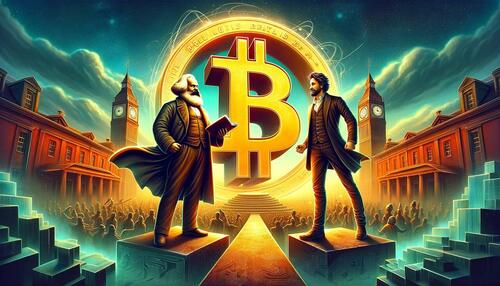
by Tyler Durden
Authored by Robert Malka via BitcoinMagazine.com,
Marxism and Bitcoin have one thing in common, the idea that a radical change in the structure of society will happen in a bottom up decentralized fashion. Which of them, if either, will succeed in that goal?

Marx tells us the revolution will be decentralized.
The Have-nots will tire of the great inequity of capitalism, and the few thousand Haves will suffer from the worldwide rebellion they encouraged through their greed.
Building central banks and controlling the money supply will force the onset of Communism.
Centralization of wealth leads to decentralized rage; the overthrow is inevitable. Class will be the deciding factor, and people of all stripes and sexes among the most developed nations will rebel first. The dominos will fall until the least developed countries finally industrialize, experience the same inequities, and become communists themselves.
This is not what happened, of course. Lenin adapted Marxism to suit his needs, and with the help of Communist sympathizers in the United States, Communism was implemented top-down in underdeveloped Russia. The dominoes toppled forcefully. Country after country fell into or out of Communism thanks to top-down or outside interests throughout the Cold War, always at the expense of the citizenry, and rarely at their behest.
Ironically, we discover, Communism has always been propped up by top-down physical force and moneyed interests, the very people Marx himself despised.
Versions or elements of Communism now exist in China and the United States. One is an initially poor, now dystopian regime that plays capitalist games, and the other is a regime struggling between political correctness, a limp conservatism, and a central bank barely holding the economy together.
Satoshi Nakamoto, the pseudonym for the creator(s) of Bitcoin, makes no political statements.
In his nine-page whitepaper and public postings, we learn how Bitcoin works, and whether it might succeed — by which he meant a high volume of transactions processed and a failure of entities to attack and delegitimize the network.
It is, however, well-established that Bitcoin’s deflationary monetary policy and peer-to-peer structure have roots in the insights of Austrian economists such as Ludwig von Mises, Friedrich von Hayek, and others — thinkers who developed their work in direct contrast to Marx and the historical, political bent of his dialectical materialism. It is no surprise then that theories have emerged about the political implications of adopting Bitcoin.
According to one theory, the most developed countries, particularly the United States, are closest to the fiat money printer. The strongest central bank is the one that runs the world’s reserve currency. The few who run that central bank can print unlimited amounts of money and launder it to suit their interests. Such interests will never align with that of their people’s, and particularly never of the countries forced to tether themselves to today’s global reserve currency, the US dollar. The dollar, not tied to gold or other hard money, will inflate into nothingness. Other central banks also printing money will suffer doubly. Their money is debasing, and the dollar on which their money relies is also debasing.
The people will figure this out, and tire of it. They will realize that they cannot store the value of their days’ work in a debasing currency, and will pull their money out of the fractional reserve banks that enable this endless printing. They will put this money into a hard asset, initially gold, and eventually Bitcoin.
Slowly, then suddenly, the revolution will be decentralized. The citizens of developed countries will invest in Bitcoin, but as relative winners in the fiat game, they will use it as a currency last. Similarly, the governments of the most developed countries will fail to take Bitcoin seriously, or be hostile to it. But the citizens of poor countries, and those with debased currencies, will leap to Bitcoin first. The poor will realize Bitcoin’s volatility is not so bad when their country’s currency hyper-inflates far faster. Its monetary policy is at least transparent. Who knows what happens in the offices of the Federal Reserve?
The citizens of smaller, poorer countries will store their value in bitcoin and transact with it. Smaller, poorer governments will see that Bitcoin gives them a way out of fiat’s approach of debt and debasement, adopting it as legal tender. The dominoes will fall. The Haves of the central banks will be overthrown, replaced by the Have-nots who had bitcoin first. The developed countries will be the last to catch on. And finally, thanks to Bitcoin’s deflationary monetary policy, the poor countries will have a leg up in this Orange New World. Someday we will live in a free-market paradise, where no one is in control of the money supply and economies can grow as The People will.
In both theories, the economic situation leads to a decentralized emotional/cultural phenomenon, namely a struggle against a corrupt oligopoly.
But when it comes to Bitcoin, this hasn’t happened as expected either.
When Nayib Bukele, President of El Salvador and head of the party Nuevas Ideas, made his country the first to adopt Bitcoin as legal tender, citizen interest in Bitcoin in El Salvador was virtually 0%. Only a few bitcoiners from developed countries, who had made their home in touristy El Zonte beach, knew anything about Bitcoin. Today, the degree of citizen-wide adoption of Bitcoin in El Salvador is over 35% and rising, with some of the thanks going to the government’s Chivo wallet, and some to non-profit efforts such as Mi Primer Bitcoin. El Salvador’s domino fell mostly from top-down efforts, and as poor a country as it is, its other legal tender is the US Dollar, the world’s reserve currency. While El Salvador doesn’t have control of the dollar’s monetary policy, it is certainly doing better by adopting it compared to Argentina or Lebanon, whose currencies are terribly debased as of this writing.
Further, there are obvious falsities here. The United States hasn’t adopted Bitcoin as legal tender, but it sure has a lot of bitcoin. The IRS has holdings. Rumor even has it that other agencies confiscate, keep, and purchase bitcoin from time to time, the latter being particularly easy for a country that’s routinely printing money.
The list of countries mining bitcoin for free money, some of which is kept, is too long a list to name. So, certainly developed countries, whether or not they acknowledge Bitcoin’s relevance publicly, are invested. So much for a leg up for the poor countries.
Finally, there is also the geopolitical exercise of using bitcoin.
Russia is accepting bitcoin for natural gas, and the UAE is warm to the asset. Both are far from poor or underdeveloped countries.
On the other hand, Nigeria isn’t rich. The Nigerian people transact in bitcoin more than anyone besides Americans. Yet the government is hostile to it, going so far as to push their CBDC, the e-Naira, on the populace. Meanwhile, savvy citizens in Argentina and Lebanon mine and save in bitcoin, while their governments don’t seem to see the urgency in using it.
So, is Bitcoin, or rather Bitcoin Economic Theory, destined to a history as murky and ubiquitous as Communism’s? Can any theory encompass this asset’s trajectory? Further, given that Bitcoin, by its nature, challenges central banks, and by extension certain normalized tenets of Communism, we should expect to see them challenge one another geopolitically — right?
Which economic incentive structure wins? Is it a soft win, forcing countries like China to accommodate the network without sacrificing their political structure? Or does it extinguish centralization altogether? Or is Bitcoin snuffed out by some ingenious circumstance none of us yet foresee?
- As it stands, Bitcoin is certainly the underdog, whose main advantage is its decentralization through its proof-of-work consensus mechanism.
- Meanwhile, fiat has a hold on every major institution on earth — including the military needed to get its way.
The geopolitical theories surrounding Bitcoin rely on the assumption that it cannot be stopped. As a computer network, anyone can run a node, anyone can transact with anyone else, and anyone can mine to secure the network and make money. It is, in fact, the most secure computer network ever built, with 99.99999999% uptime and zero successful attacks made against it.
Laws cannot stop people from using Bitcoin. Though it is possible to track purchases made on the ledger, allowing governments to arrest or harm people who defy such laws, theoretically, people will move out of such places and move to places where they can transact in their money of choice. People who try to attack the network by co-opting hashrate will find they’ll make more money supporting the network rather than investing energy to work against it.
The fact that it’s hard money means everyone — including those who despise it — will eventually opt into storing their value within the network, preventing them from wanting to sabotage it and lose their wealth. Only the few closest to the money printer have the most to lose in moving to a Bitcoin Standard. They cannot navigate a world in which they lose control of the predominant money. If they can’t beat them, they’ll join them.
I would be remiss without mentioning Major Jason Lowery’s theory, which, while controversial, makes for a compelling story: As Bitcoin finds its way into every nook and cranny, nation-states will come to adopt Bitcoin and wield it as a geopolitical weapon, sublimating the motivation to go to war. Instead, there will be warring hash rates, and geopolitical divisions along the lines of bitcoin mining. This is a compromise of sorts between both ideas, whereby Bitcoin is co-opted by the present authorities — members of the central bank included — but Bitcoin finds a way to shift their incentives in its favor.
To the extent that they can hoard the remaining bitcoin, and attempt to dominate the network by conquering hashrate, Major Lowery’s proposed economic ‘game’ may find some reality. While there are several valid critiques of Lowery’s thesis, a version of such an event may occur. Per Limpwar, countries that adopt Bitcoin as legal tender first, attempting to leverage it against other countries, may find themselves trapped. Adversarial countries could sell their bitcoin during a competing country’s recessions, further plummeting the purchasing power of that country in the short term. If a military initiative follows that up, it could be the difference between a win or a loss.
Similarly, a government could hoard bitcoin for just such a response against its people. As its people commit to revolution, having primarily committed their assets to Bitcoin, the government may sell a substantial sum of bitcoin, weakening its people’s assets. Perhaps other countries or citizens would purchase that bitcoin, once again raising the price. Perhaps it would take longer than expected. As we’ve seen, bear markets can reliably last more than a year, and it only takes a few whales to shift the price of bitcoin dramatically. There is not yet any reason to believe that the Bitcoin economy will behave differently in the future.
My position is that imposing a framework onto Bitcoin indicates a lack of integrity. The network will thrive where it is needed, and falter where it is not. It is not yet obvious that it will be equally needed everywhere, or have equal value everywhere. Gulf countries, for example, may come to hoard bitcoin, but find no need to spend it, preferring to transact in their fiat currency, grounded in the value of their natural and digital assets. The citizens of such regimes may do the same, feeling no need to transact internationally, and possessing no strong economic incentive to use bitcoin.
Struggling countries may be similarly slow to adopt Bitcoin, preferring to clamp down on their citizens, who may not be prepared to suffer for transacting with digital assets. The people of China may experience such a fate. Certainly, this seems to Bitcoiners like a geopolitical medium-term stupidity. But many regimes engage in such stupidities.
And finally: would a Bitcoin economy look dramatically different from the way the economy looks today? It seems very likely that the economy will be similar under a Bitcoin Standard as it is under the fiat system. Any large changes to such a system would take generations, and even such changes might simply be iterations to the current system rather than the radical vision of a few Bitcoiners. There will still be credit. Many people will sill prefer to leave their money with intermediaries. Countries will still have central bodies managing the purchase, sale, and holdings of bitcoin, along with how they legally navigate the network and the transactions that it services. Perhaps countries will spend less than they do today, or focus less on GDP – but is it really so wild to believe that, when push comes to shove, countries won’t continue to spend more than they have? We believed before World War One that spending more money than a country had was impossible – but Europe kept the war going for what was believed to be an impossibly long time. Bitcoin will never be able to eliminate that instinct. Where There’s a Will, There’s a Way.
So, perhaps Bitcoin will win over centralization, Communism, and the threat of infinite inflation in the long term. In the short- and medium-term, perhaps a societal chiropractic adjustment will be recognizable, to those of us who are watching.
* * *
Marx believed that all culture and politics was built atop the economic structure of a people. Our economics defines us, and its historical progression, from tribal bartering to feudalism to the free market, to communism and beyond, is inevitable. There are a non-zero number of Bitcoiners who also presume an historical teleology for Bitcoin, in fact only disagreeing with Marx on which inevitability to expect: Communism or Bitcoin. Red or Orange. Many, but not all, of the prominent Maxis are Christians. Hegel, who inspired the dialectical materialism of Marx, undoubtedly (and, given Marx’s atheism, ironically) borrowed from Christian theology to devise The Phenomenology of Spirit. It makes some sense then that in economics both see a kind of savior of history. Both, therefore, believe that only their asset, or approach, will win, and that a new politics will broadly be inspired from it. Whether a new politics is brought about from one or the other is not only possible, but proven. We see how Marxism has inspired virulent political strands of itself. Bitcoin may very well do the same.
But to believe, as both may, that only their approach will come to dominate — Marx’s because of the fundamental (and necessarily-always-growing) inequity born of the Haves always taking from the Have-nots, and Bitcoin’s because no other asset is a superior storer, transferrer, and protector of energy and value — seems shortsighted. It may also be true that the whole framing of this problem is wrong. Perhaps economics is not the base upon which cultural and political superstructures are built – that, instead, economics merely influences some, but not nearly all, of a society’s functions. Believing otherwise puts us in too narrow a framing, risking the chance we miss the roots of other deep cultural or political issues. Addressing such an issue would require that we address whether, as Marx believed, all philosophical issues fundamentally stem from the material world, and whether new philosophies can only emerge from new material conditions.
Regardless, we see that both philosophies haven’t played out the way anyone expected. And, for the first time since Marx wrote, we have a real application of Austrian economics. The latter never had a political chance against the zealotry of Marxism until Bitcoin’s emergence. However, given that Marxism is fundamentally a philosophy of ressentiment, and though bitcoin may displace it, it is unrealistic to believe it will eliminate it altogether.
Fundamentally, the workers of the world who remain resentful, even if Bitcoin wins, will either infect elements of it with their philosophy — technology, too, can be driven in unexpected directions — or they will bide their time until the next opening.
In another 300 years, who knows what will come of Bitcoin? Who knows whether the integrity of such a system will last, or whether central banks not only remain, but thrive in a new form?
Maxi fanaticism is not ungrounded. Bitcoin has shifted the economic landscape of whole countries, and saved the wealth of many. It promises to shift the very fabric of money and the way we navigate energy.
And yet it seems that no clear theory can encapsulate it. Bitcoin is filling up, slowly but surely, a great space where once there was ocean. Will it continue to fill every space until we navigate with it, as fish do water? And who knows if other such economic theories won’t continue to compete. But the way there will be long and bumpy, and undoubtedly the dominos will not fall in any of the ways we can possibly imagine.


Be gentle with your skin. Our soaps are kind to your skin and create a creamy, silky lather that is nourishing. Small batches are made by hand. We only use the best natural ingredients. There are no chemicals, phthalates, parabens, sodium laurel sulfate, or detergents. GraniteRidgeSoapworks
To Get 20% Of Use Coupon Code Bankster20 Or HNews20

![]()




